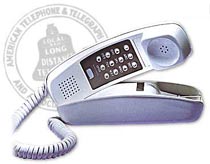| (insert your NIE or newspaper logo here) |
Weekly Online LessonOnline Lesson ArchiveGrade Level: 5-7
|
Phone Companies Off the Hook
 Unless the U.S. Supreme Court intervenes, the cost of talking to
your friends on the phone could get more expensive by the end of the
year.
Unless the U.S. Supreme Court intervenes, the cost of talking to
your friends on the phone could get more expensive by the end of the
year.
In the recent case of USTA (United States Telecom Association) v. FCC (Federal Communications Commission), an appeals court essentially ruled against regulations outlined in the Telecommunications Act of 1996.
The Act requires the four major regional phone companies to make their telecommunication networks available to rival phone companies at big discounts. It has allowed smaller phone companies to tap into the extensive networks and offer service at lower rates.
On Wednesday, June 9, 2004, the federal government decided not to support an appeal to the Supreme Court. While some experts, businesses and consumers believe that the change could lead to higher phone rates, others think that such a policy is better because it favors customer choice.
Without the government's support in the case, the Supreme Court will likely not review, and therefore not overrule, the decision.
The telecommunications regulations came about in the first place because of a monopoly-like group of telephone companies, called the Bell System. To open up fair market competition, the Telecommunications Act was adopted and the Bell System was broken up. The four resulting companies were Verizon, SBC Communications, BellSouth and Qwest Communications.
But this legal feud is just the latest in the business of communicating over long distances, which has been an important part of organized societies for centuries. Through the years, sending and delivering messages and information from place to place and person to person has evolved from using human carriers on the ground to electrical impulses through wires and through the air.
To understand where we're going, it's good to know where we've been. So this week, you'll plug into the history and technology of the telephone and other methods of communicating long-distance.
Getting Connected
 For
this lesson, you'll tap into the technology library at ThinkQuest, and
start with the History
of Communication - Through the ages and into the next century.
This will give you a good overview of how humans have developed the
need and process of communicating to each other.
For
this lesson, you'll tap into the technology library at ThinkQuest, and
start with the History
of Communication - Through the ages and into the next century.
This will give you a good overview of how humans have developed the
need and process of communicating to each other.
Once you've entered the site, keep at least one browser window open to avoid needing to re-enter through the ThinkQuest entry page every time to visit a new section.
Enter the site, then begin with the Time Line. How long was it after the invention of the first daily newspaper that the telegraph was invented? Then how many years did it take for the telephone to be invented? When was the first radio station launched? When was the first television program aired?
Let's take a closer look at human communication's roots, by browsing through the methods of Early Communication, the Printing Press, and the Telegraph.
 For what reasons did people want
to communicate information and ideas to one another? How exactly did
people develop these different ways to communicate -- to individuals
and to broader audiences? In what ways did these new communication tools
influence society?
For what reasons did people want
to communicate information and ideas to one another? How exactly did
people develop these different ways to communicate -- to individuals
and to broader audiences? In what ways did these new communication tools
influence society?
Now let's move on to the Telephone, Radio, Television, and Computers.
How exactly does each telecommunication device help connect people to people or people to information?
Our Wired (and Wireless) World
 The
next ThinkQuest site will take you Through
the Wires: A Century of Telecommunications. Click Visit
Site. What is the definition of "telecommunications"?
The
next ThinkQuest site will take you Through
the Wires: A Century of Telecommunications. Click Visit
Site. What is the definition of "telecommunications"?
As you browse through this site, if you can't see anything on the page once it's loaded, click your browser window's Refresh or Reload button.
Begin exploring the site with the History section. Here, you'll learn more about The Telegraph, The Invention of Radio, The Telephone, the Fax Machine and the Internet. Take the related quiz at the end of each page.
What kinds of inventions, scientific discoveries, infrastructure, and consumer demand had to precede each communication method in order for it to work? In what ways did these new telecommunication tools shape American society? How do they influence daily life today?
Next, discover the more technical Fundamentals of telecommunications technology. From Analog and Digital Signals, to Bandwidth, Protocols, Compression, and the Bare Basics.
 How
exactly is information sent and translated using electricity? What does
bandwidth have to do with how and how much information is or can be
sent? Why are standardized protocols necessary for these telecommunications
systems to work? How does compression make transmissions for efficient?
What's the difference between bits, bytes, and bauds?
How
exactly is information sent and translated using electricity? What does
bandwidth have to do with how and how much information is or can be
sent? Why are standardized protocols necessary for these telecommunications
systems to work? How does compression make transmissions for efficient?
What's the difference between bits, bytes, and bauds?
To get a better idea as to how all of that translates in every day uses, browse the Telegraph, Broadcasting, Media, and Pubic Networks sections.
If you have time, check out the Advanced Technologies. Topics in this section illustrate how what we've learned over the years is helping us improve these basic telecommunication devices and to invent new ones.
Which of the fundamental and advanced technologies do you, your friends, or family members rely upon every day? What devices or services must a person purchase in order to take advantage of these telecommunication networks? Who (what companies or entities) created or currently own these networks or sell these services? How do the different companies work together (or not) to make these networks and services available to the public?
Newspaper Activities
Browse current issues of Targetnewspaper and find all of the articles and advertisements related to telecommunications. Do the stories and ads feature new developments in infrastructure or new devices (like video phones or text messaging units)? If so, how is each based upon what came before? Is there any new scientific discovery or invention that allowed the new development to occur? Was the development influenced by consumer demand? How do you think the improved network or device will affect how people communicate or share information? If you find a news article about a telecommunications company, how do their activities influence the industry, and society as a whole?
© Copyright 2004
Learners
Online,
Inc.
